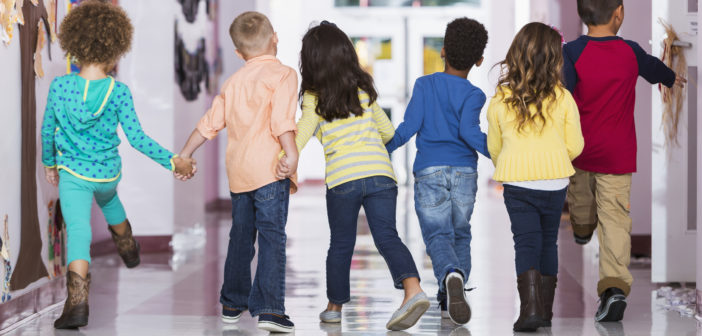Between school starting, easing back to a regular schedule, and setting up appointments, chances are you’re thinking about all you need to do to keep your kids healthy this fall. And with the risk of contracting COVID still a concern, you may be thinking about the vaccine for your littlest babes. You probably have lots of questions about the safety, when to get it, if it really helps kids and why do it at all. To help make an informed decision about what’s right for your child, RWJBarnabas Health went to two pediatricians—Amisha Malhotra, MD, Pediatric Infectious Disease Physician at the Bristol-Myers Squibb Children’s Hospital at Robert Wood Johnson University Hospital, and Associate Professor of Pediatrics at Rutgers Robert Wood Johnson Medical School and Uzma Hasan, MD, Division Director, Pediatric Infectious Diseases at Cooperman Barnabas Medical Center—for details on the vaccine for kids under 5. Read on for what they want you to know. (featured photo credit: istock/kali9)
This post is sponsored by RWJBarnabas Health, helping all NJMOMs and their families stay healthy.
First—can you explain the vaccine, how it works, and the recommended dosing and ages?
Dr. Malhotra: The current COVID pediatric vaccines available for children under 5 (Pfizer-BioNTech and Moderna) are mRNA vaccines and are the same mRNA vaccines licensed for use in adults and older children. The mRNA (messenger RNA) is a blueprint or a code used to help make proteins our body needs to function. The mRNA vaccines take advantage of this process, and COVID-19 mRNA vaccines contain a code that gives instructions for our cells to make a harmless piece of the “spike protein” found on the surface of the virus that causes COVID-19. This spike protein then triggers an immune response inside our bodies. That immune response, which produces antibodies, protects us if the actual virus enters our bodies.
The COVID-19 vaccine dosage is based on age on the day of vaccination, not on size or weight. Children get a smaller dose of the COVID-19 vaccine than teens and adults, which is the right amount for their age group. The vaccine schedule for children aged six months to 4 years depends on the type of vaccine used. The Pfizer-BioNTech vaccine is a 3-dose schedule, and Moderna is a 2-dose.
Is it safe to give to young kids and babies?
Dr. Malhotra: Before authorizing or approving COVID-19 vaccines, scientists conducted clinical trials with thousands of children and teens to establish their safety and effectiveness. The Centers for Disease Control and Prevention (CDC) and U.S. Food and Drug Administration (FDA) continue to monitor vaccines, keep people informed of findings, and use data to make COVID-19 vaccination recommendations. Through continued safety monitoring, the COVID-19 vaccination is safe for children and teens. The known risks and possible severe complications of COVID-19 outweigh the potential risks of having a rare, adverse reaction to vaccination.
So many vaccinated people still get COVID, and the illness in kids is relatively mild. So why should you vaccinate your child if they will get it anyway?
Dr. Malhotra: Children who get COVID-19 can get very sick and may require treatment in a hospital and, in rare situations, even die. The benefit of getting a COVID-19 vaccine is a safer, more reliable way to build protection than risking the potentially serious consequences of getting sick with COVID-19. Getting eligible children vaccinated can help prevent them from getting sick even if they get infected and help avoid serious short- and long-term complications of COVID-19. Children can transmit the COVID-19 virus to others when sick, so vaccinating them can help reduce the transmission of the virus to others. Vaccinating children can also give parents greater confidence in their children participating in childcare, school, and other activities.
Dr. Hasan: If a child is infected and not vaccinated, they will have higher rates of re-infection when compared to vaccinated kids. And hospitalization rates are 1.4 times higher in unvaccinated children. Vaccinated children also have higher antibodies to the variants—this is important because antibodies produced by a previous infection may not protect against new strains.
If my child still hasn’t received many vaccines and is scheduled for others, can the COVID vaccine be co-administered? And are there any side effects?
Dr. Hasan: Yes, absolutely—the COVID vaccine can be safely administered with other vaccines. Your child’s routine immunizations should not be delayed. When vaccination rates fall, it impacts herd immunity, which is why we may see a resurgence of illnesses like measles or chickenpox.
Most side effects are mild, with some injection site soreness with the first dose. Fever is typically seen more often after the second dose of the vaccine. Some kids may experience fussiness, irritability, loss of appetite, fatigue, and headache. Additionally, there have been no cases of myocarditis (inflammation of the heart muscle) reported in this age group.
If my child has recently had COVID, do I still need to vaccinate? And if so, when?
Dr. Malhotra: Yes! The CDC recommends that individuals get vaccinated even if they have already had COVID-19 because they can be infected more than once. While your child may have some immunity after recovering from COVID-19, we don’t know how long this protection will last. Vaccination is safe, including in a child who has already been infected. Children who get COVID-19 are at risk of serious illnesses; some have debilitating symptoms that persist for months. Children infected with COVID-19 can have their next dose delayed three months from when symptoms started or if they did not have symptoms when they received a positive test result.
Is my child going to need a booster? And if the new and improved vaccine comes out, should I wait to get that for my child?
Dr. Hasan: Further studies are being done to determine if boosters will be needed in the 6mo-5 year age group, but it is possible. It is best to vaccinate your child since all vaccines have similar efficacy and offer protection—the sooner, the better!
Is there anything about the vaccine you want to add?
Dr. Malhotra: The good news is that COVID vaccination in our littlest ones—just like for older kids and adults—is likely to prevent severe infection, complications, and death related to COVID-19. I have confidence in these vaccines’ ability to reduce the risk of serious harm significantly and safely from COVID-19 for our children.








